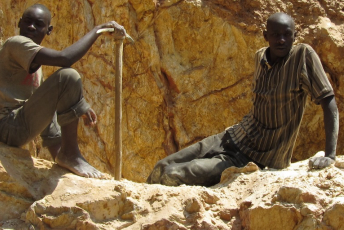Illegal mining in northern Nigeria is leading to two worrying trends. One is the exchange of illegally mined gold for weapons, and the other is the use of women and girls in these illicit activities.
Nigeria’s north, especially Kaduna, Katsina, Kebbi, Kogi, Nasarawa, Niger, Plateau and Zamfara states, is particularly hard hit. An estimated 80% of mining in these areas is carried out illegally and on an artisanal basis, involving over two million people who depend on illegal mining activities for survival.
The spread of illegal gold mining across these areas is due to the rise in the world market price of gold since 2009. Nigeria’s Mines and Steel Development Minister Olamilekan Adegbite has identified a collaboration between ‘some Nigerians in high positions of authority’ and foreigners from Burkina Faso, Ghana, Mali, China and India who engage in illegal mining and smuggle and sell gold through neighbouring countries. Nineteen foreigners are currently standing trial for illegal mining activities in Osun and Zamfara states.
The exchange of illegally mined gold for arms and ammunition is especially rife in north-west Nigeria, particularly between Zamfara State and the Republic of Niger.
The free flow of arms has fuelled both violent local conflicts and rural banditry across the region. Between June 2011 and May 2019, over 3 600 people were kidnapped in Kaduna, Katsina, Kebbi, Sokoto and Zamfara states, while 6 319 people, including women and children, were killed in Zamfara State alone by bandits and in mining-related conflicts.
A significant feature of both the mining and the conflict is the involvement of women and young girls – some as young as 12 and 15 years old. Across the north-west, particularly in Zamfara State, girls and women are involved in illegal mining in two ways.
First, girls are used in the mining fields as labourers by illegal miners. This exposes them to severe poisoning by lead dust that results in health problems and death. This is also illegal, as seen in the International Labour Organization’s Convention No. 138 on minimum age (adopted in 1973) and No. 182 on the worst forms on child labour (1999).
It also puts women in mining camps and communities at risk of attendant vulnerabilities. A 2020 study by the Nigerian Extractive Industries Transparency Initiative found that socio-economic dislocations through illegal mining led to drug use, alcoholism and prostitution among women in mining communities.
The second level of girls’ and women’s involvement is as carriers of illegally mined gold that is then exchanged for arms. Idris Mohammed, a violence and transnational conflict analyst based in Kaduna State, told ENACT that young girls and women are used to transport weapons from the borders to the mining sites in Zamfara and illegally mined gold from the sites to the borders.
Mohammed explains that women and girls have been used to transport arms brought in by youth from the north-west who were returning from conflict in Libya after the death of Muammar Gaddafi. Most of the returning youth engaged in illegal mining and rural banditry using the weapons they’d brought from Libya.
More broadly, criminal groups see a number of advantages of girls and women facilitating exchanges of gold for arms and ammunition across the borders. Girls and women are paid less than male counterparts. At times they are used by arms traffickers and gold smugglers to bribe border security officials. Mohammed also notes that organised criminal arms traffickers and gold smugglers pay girls and women less than their male counterparts.
Analysts say the gendered dimension of illegal mining in northern Nigeria may also be fuelled by a volatile security context characterised by ungoverned spaces where state authority and capacity have been weak, declining or absent. Criminal networks have emerged in these spaces and now effectively control these territories. The services and support from the state are largely absent.
Here the organised criminal groups are also playing a quasi-state function, importantly providing a means for more vulnerable and impoverished people to eke out a living.
The result is a thriving lucrative underground economy in liquid cash created and run by clandestine organisations and criminal syndicate groups, including illegal miners, into which women and girls are recruited. The involvement of women, girls and minors in illegal mining and the exchange of gold for arms highlights most fundamentally the country’s socio-economic problems – especially inadequate state responses to poverty and poor service delivery.
That over two million people, including women and girls, depend on illegal mining activities for survival indicates a high level of unemployment and poverty, particularly among the youth, who have limited income-generating opportunities.
This poverty, especially in northern Nigeria, is exacerbated by escalating security crises. These include the Boko Haram insurgency, conflict between sedentary farmers and nomadic herdsmen, and rural banditry, which have caused displacement and social dislocation.
The use of minors is also informed by the increasing number of out-of-school children in Nigeria. According to the United Nations Children’s Fund, the number of children not in school in Nigeria rose from 10.5 million in 2017 to 11 million in 2019. Children under 15 years old accounted for 45% of the total number. Sixty percent of these children are in northern Nigeria, and over 75% of these are girls. It’s very easy for illegal miners and arms traffickers to recruit from this pool of out-of-school girls.
To address the dangers for women, girls and minors in gold and arms smuggling, the government presence and regaining control in these ungoverned areas, which serve as smuggling routes and hubs, becomes imperative.
While the government continues to prosecute illegal miners for illegal mining itself, expanding this to include prosecutions for entities using minors as labourers and carriers of illegally mined gold and arms across borders would be a first step in creating awareness of this crime and its risks to girls and women. Intensive and extensive awareness creation and community engagement on the consequences of use of minors in illegal mining may be another important element of increasing human security in the region. Yet the absence of viable and legal means of income generation means that in addition there is still a long road to travel to achieving lasting security in the states in the north-west of Nigeria.
Maurice Ogbonnaya, Senior Research Consultant, ISS Pretoria







